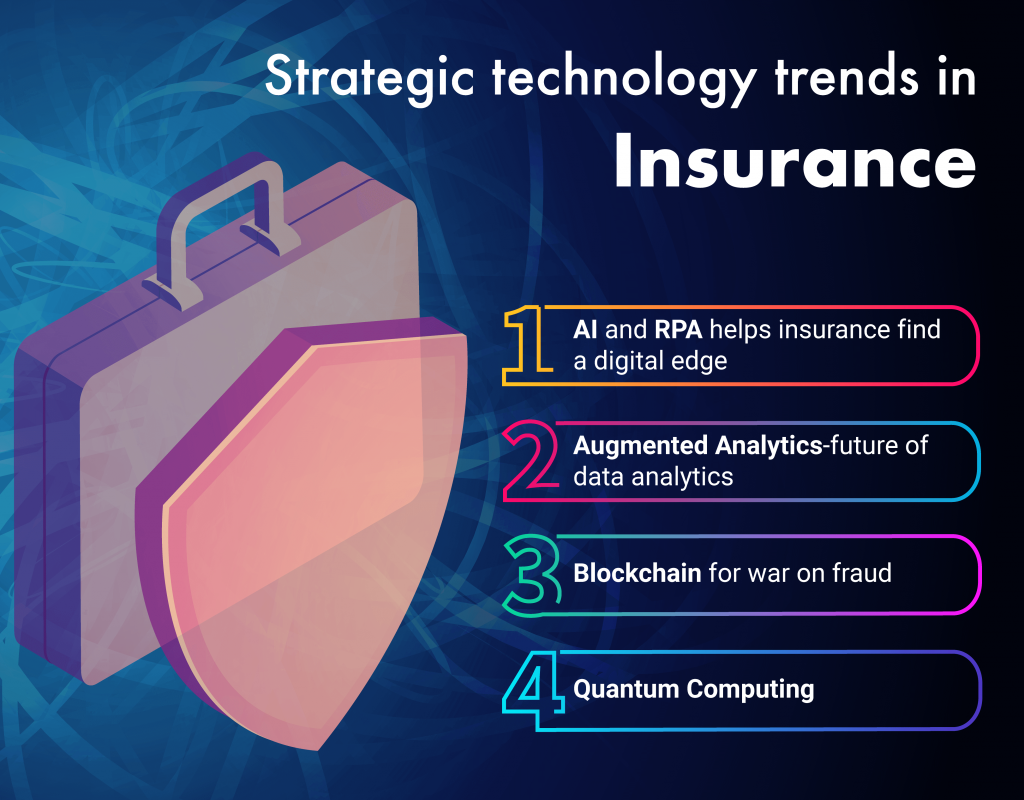“Strategic technology trend is one with substantial disruptive potential, that is beginning to break out of an emerging state into broader impact and use, or which are rapidly growing trends with a high degree of volatility reaching tipping points over the next five years”, says Gartner.
These technology trends shall enable insurers to expand into more ecosystems than ever before. Let us explore such strategic technology trends, which will impact the insurers in the near future.
1. AI & RPA helps insurance find a digital edge:
AI and RPA are already a reality for insurance. AI has found its way into vehicles, homes, and businesses and in the Insurance industry as well, it solves the necessary day-to-day tasks of running a business by the automation of routine patterns. It is able to tailor solutions for individual customers and replace the one-size-fits-all products currently available. “AI in insurance will allow carriers to deliver scalable and customized solutions for members and policyholders,” says Ramon Lopez, Vice President of Property & Casualty Claims and Innovation at USAA.
RPA tools currently occupy the Peak of Inflated Expectations in the Gartner Hype Cycle for Artificial Intelligence, 2018. RPA is widely adopted in various industries, insurance included. “End-user organizations adopt RPA technology as a quick and easy fix to automate manual tasks,” said Cathy Tornbohm, vice president at Gartner. In the insurance industry automation of the day-to-day tasks would potentially reduce cost, time consumption and increase accuracy, quality and competency.
2. Augmented Analytics- future of data analytics:
One of the latest advancements for business development tools is the advent of augmented analytics. As per a report from Deloitte “Augmented analytics marks the next wave of disruption in the data analytics market”. It is an approach that automates insights using machine learning and natural language generation. Gartner predicts “by 2020, more than 40% of data science tasks will be automated”, resulting in increased productivity and broader use by data scientists. According to Accenture, “1 out of 3 insurers globally now uses Big Data from IoT technologies, such as Fitbit, Samsung Gear or Apple watch to collect lifestyle data from insureds”. Augmented Analytics will help reap business value from those data by automating Big Data insights. The insurance industry is expected to be the biggest beneficiary as it will help increase the accuracy and end the traditional “gut-feeling” decision-making approach.
3. Blockchain for war on fraud:
Blockchain is one of the biggest fourth industrial revolutions for many industries, including insurance. Insurance fraud costs more than $40 billion a year. The insurance companies can use “the distributed ledger” to potentially lower fraudulent claims, cost, transaction settlement time and improve cash flow.EY, Guardtime, A.P. Møller-Maersk, Microsoft, and ACORD collaborated and launched blockchain-powered marine hull insurance platform Insurwave in 2018. The platform is now in commercial use and handled risk for more than 1,000 commercial vessels and 500,000 automated transactions in its first twelve months of operation. More than 38 insurance companies have embarked on an initiative called the B3i to explore Blockchain applications in insurance. “In the past decade, technological advances from artificial intelligence to Blockchain have transformed business models in every sector and insurance is no exception. Dubai World Insurance Congress embraced the future of the industry with insights from the sector’s most established and innovative leaders,” said Arif Amiri, Chief Executive Officer of DIFC Authority.
International Data Corporation (IDC) analysis shows “worldwide spending on Blockchain solutions could reach $11.7 Bn in 2022”. Blockchain gives the insurance company an independently verifiable data set so they don’t have to rely on the customer’s version. It is emerging as the central repository of truth for many blockchain use-cases. According to Gartner reports, “Blockchain will create $3.1T in business value by 2030”.
4. Quantum Computing:
Quantum computing is rising on the Gartner Hype Cycle. It is expected to become one of the greatest disruptions of the age. Quantum computing has the ability to process huge datasets and models that would have previously taken days and weeks. It can help calculate risks, of almost any nature, such as the impact of an approaching hurricane on a specific region.
According to a recent Novarica executive report, “Quantum Computing and Insurance: Overview and Potential Players,” by Mitch Wein and Tom Kramer offer various use cases of quantum computing. However, not many insurers are working with quantum algorithms. They are still seen as technologies that are on the distant horizon and not in their face like artificial intelligence.
The insurance industry has a complex infrastructure and legal restrictions. However, with investments in these Strategic Technology trends, insurers can become more customer-centric, achieve growth and lower cost.
https://www.linkedin.com/pulse/case-study-insurance-industry-denis-mwarania
https://tractable.ai/blog/together-towards-ai-notes-from-insuretech-connect-2017
https://www.dig-in.com/list/top-5-insurance-quantum-computing-use-cases
https://www.cbinsights.com/research/blockchain-insurance-disruption/
Knowledge thats worth delivered in your inbox





